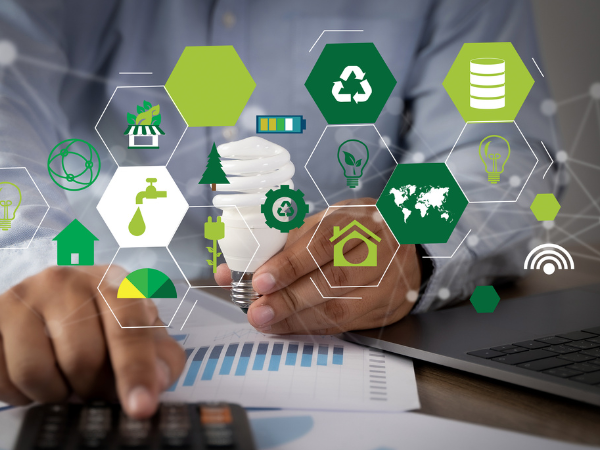
In an era where environmental concerns are at the forefront of global discussions, businesses are increasingly recognizing the importance of adopting sustainable practices. Sustainability is no longer just a buzzword; it’s a critical component for long-term success. In this article, we’ll explore strategies for incorporating sustainable business practices to enhance environmental responsibility.
Embrace Circular Economy Principles

Adopting a circular economy approach is like becoming a recycling superhero. Imagine this — instead of throwing things away, we make a commitment to minimize waste and make stuff last longer. It’s like giving our products a second chance at life! How do we do this? Well, it’s pretty simple. Recycling is the first step — turning old things into new things. Think about those plastic bottles or cardboard boxes — instead of letting them pile up in the trash, we send them off to get a makeover and come back as something new and useful.
But it’s not just about recycling; it’s also about reusing stuff. Don’t ditch that old t-shirt just yet — maybe it can become a cool shopping bag or a comfy pillowcase. By giving our things a second or even third life, we’re reducing the need to produce more stuff, which is awesome for the planet. And here’s the real game-changer — closed-loop systems. Sounds fancy, but it’s basically about making sure our products don’t become trash. Companies can lead the way by creating systems where products can be recycled, remade, and reused over and over again — like a never-ending cycle of awesomeness.
Energy Efficiency and Renewable Energy Sources
First up, energy efficiency. Imagine if you could do the same amount of work but use less energy — that’s what energy efficiency is all about. Businesses can invest in technologies that do things smarter, like using LED lights instead of regular ones or getting appliances that don’t guzzle up a ton of electricity. It’s like upgrading to a more fuel-efficient car but for your business. Now, let’s talk about the real rockstars — renewable energy sources. We’re talking about solar panels, wind turbines, and other cool green solutions. Instead of relying on fossil fuels that harm the planet, these sources harness the power of nature — like the sun and the wind. It’s like getting energy from sources that never run out, making it a win-win.
But here’s the kicker — it’s not just about being eco-friendly; it’s also about saving some serious cash in the long run. Investing in renewable energy sources can lead to cost savings over time. Those solar panels soaking up the sun? They’re not just being green; they’re putting green back in your pocket by reducing electricity bills.
Supply Chain Sustainability
First things first — what’s a supply chain? Think of it like a journey. It’s the path that products take from being just raw materials to becoming something you see on the shelf. Now, making this journey sustainable is the key. So, assessing and optimizing the supply chain is a big deal. Companies need to take a close look at every step of the process to make sure it’s not harming the environment. It’s like checking all the stops on a road trip to make sure you’re not leaving a mess behind.
Now, here’s where the magic happens — collaboration. Businesses can team up with suppliers who also want to be Earth-friendly. It’s like finding buddies who share the same values. Together, they make sure that everything — from the raw materials used to the final product — follows sustainable standards. It’s not just about making a product; it’s about making it in a way that’s good for the planet. Speaking of raw materials, responsible sourcing is the name of the game. It’s like choosing ingredients that are friendly to the Earth. This helps in preventing damage to the environment and supports ethical practices. It’s like being picky about what goes into your recipe to make sure it’s both good for you and the planet.
Green Packaging Solutions
Packaging can be a bit of a troublemaker when it comes to the environment. It piles up in landfills, and some types take forever to break down. Not cool, right? But here’s the good news — businesses can make a change, and it starts with green packaging solutions. First up, eco-friendly materials. It’s like choosing clothes made from sustainable fabrics, but for packages. Businesses can switch to materials that are kinder to the planet. No more harmful stuff — just packaging that doesn’t stick around forever.
And how about cutting down on the extras? Businesses can be a bit like chefs — they can use just the right amount of ingredients. In this case, it’s all about reducing excess packaging. No need for those layers upon layers of wrapping when a simple, eco-friendly one will do the job.
Employee Engagement and Sustainability Culture
Think of employee engagement as everyone in the office being part of a team, like players in a game. Engaged employees are the ones who feel connected, involved, and excited about their work. It’s like having a bunch of teammates cheering each other on. Now, why does this matter in the context of sustainability culture? Well, when everyone’s on the same page, it’s easier to make positive changes. Engaged employees are like a power-up for a company’s efforts to be more eco-friendly. They come up with ideas, get involved in green initiatives, and become the driving force behind making the workplace greener.
And here comes the sustainability culture — it’s like the vibe of the workplace. Imagine if everyone in the office is excited about being green. It’s not just a job; it’s a mission to make the workplace and the world a better place. It’s like having a shared goal, and that goal is to be kinder to the planet.
Leveraging Technology for Sustainability
Technology is not just about smartphones and laptops; it’s a game-changer when it comes to being kinder to the environment. It plays a crucial role in making businesses more sustainable. First off, data analytics. It’s like having a super-smart friend who keeps an eye on everything. Businesses use data analytics to check how much energy, water, or materials they’re using. It’s not about being nosy; it’s about understanding where things can be done smarter. By monitoring and optimizing resource usage, businesses can find ways to be more efficient — using just what they need and not a drop or byte more.
Now, let’s talk about green technologies. It’s not about having a bunch of trees and flowers in the office (though that would be nice); it’s about using technology that’s kind to the planet. Businesses can invest in innovations like energy-efficient machines, eco-friendly materials, and smarter systems that cut down on waste.
Regulatory Compliance and Advocacy
Imagine regulatory compliance and advocacy like the handbook for a game — businesses need to follow certain rules and regulations, especially when it comes to the environment. It’s not about making things complicated; it’s about doing things in a way that’s safe and responsible. Staying informed about these rules is essential to avoid any missteps and keep everything on the up-and-up.

But here’s where it gets interesting — advocacy. It’s not just about following the rules; it’s about being a voice for positive change. Think of it like being a cheerleader for the planet. Businesses can step up and actively support even stricter environmental standards. It’s not about doing the minimum; it’s about pushing for rules that make a bigger impact in favor of the environment.
Supporting environmentally friendly policies is another way to make a real impact. It’s like putting your weight behind rules and regulations that genuinely care for the planet. By advocating for these policies, businesses contribute to a broader movement towards sustainability. It’s not just about making their own practices better; it’s about inspiring change on a larger scale.
Sustainable business practices are not just a choice; they are a necessity for companies looking to thrive in a world increasingly focused on environmental responsibility. By embracing circular economy principles, prioritizing energy efficiency, optimizing supply chains, adopting green packaging solutions, fostering a sustainability culture, communicating transparently, leveraging technology, and advocating for regulatory compliance, businesses can play a pivotal role in creating a more sustainable and environmentally conscious future. In doing so, they not only contribute to the well-being of the planet but also position themselves as leaders in their industries.
RUCHI RATHOR Founder & CEO
Payomatix Technologies Pvt. Ltd.
FOUNDER AND INVESTOR | PAYMENTS PROCESSING EXPERT | MERCHANT ACCOUNT SOLUTIONS | WHITE LABELLED PAYMENT GATEWAY | Dreamer, Creator, Achiever, Constantly Evolving
Website Ruchi Rathor: https://ruchirathor.com
Website Healing Heart https://thehealingheart.me/
Instagram https://www.instagram.com/_ruchirathor_/
LinkedIn https://www.linkedin.com/in/ruchirathor12/
Facebook https://www.facebook.com/ruchi.rathor.magnificient
Tumblr https://www.tumblr.com/blog/ruchirathor-thehealingheart
Medium https://medium.com/@ruchirathor_23436









